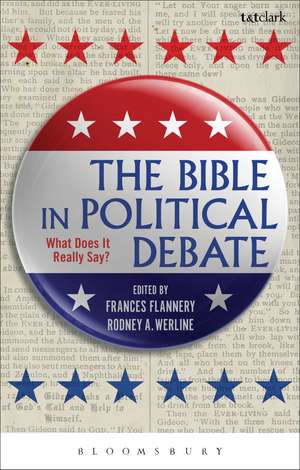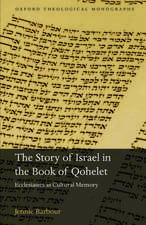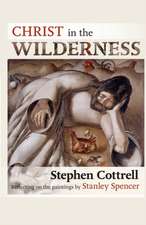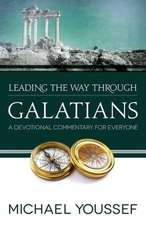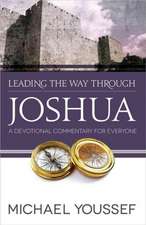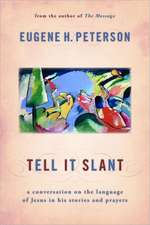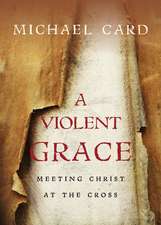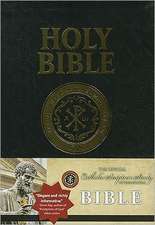The Bible in Political Debate: What Does it Really Say?
Editat de Frances Flannery, Rodney A. Werlineen Limba Engleză Paperback – 21 sep 2016
| Toate formatele și edițiile | Preț | Express |
|---|---|---|
| Paperback (1) | 157.75 lei 22-36 zile | |
| Bloomsbury Publishing – 21 sep 2016 | 157.75 lei 22-36 zile | |
| Hardback (1) | 495.80 lei 43-57 zile | |
| Bloomsbury Publishing – 21 sep 2016 | 495.80 lei 43-57 zile |
Preț: 157.75 lei
Preț vechi: 172.33 lei
-8% Nou
Puncte Express: 237
Preț estimativ în valută:
30.18€ • 31.60$ • 24.98£
30.18€ • 31.60$ • 24.98£
Carte disponibilă
Livrare economică 17-31 martie
Preluare comenzi: 021 569.72.76
Specificații
ISBN-13: 9780567666574
ISBN-10: 0567666573
Pagini: 208
Dimensiuni: 138 x 216 x 12 mm
Greutate: 0.25 kg
Editura: Bloomsbury Publishing
Colecția T&T Clark
Locul publicării:London, United Kingdom
ISBN-10: 0567666573
Pagini: 208
Dimensiuni: 138 x 216 x 12 mm
Greutate: 0.25 kg
Editura: Bloomsbury Publishing
Colecția T&T Clark
Locul publicării:London, United Kingdom
Caracteristici
Considers the role of the bible in public policy. The publication is timed to coincide with the American election
Notă biografică
Frances Flannery is Director at the Center for the Interdisciplinary Study of Terrorism and Peace, and Professor of Religion at James Madison University, USA.Rodney A. Werline is Professor of Religious Studies, Leman and Marie Barnhill Endowed Chair in Religious Studies, and Director, Barton College Center for Religious Studies at Barton College, USA.
Cuprins
PrefaceAcknowledgementsIntroduction: The Bible and Political Debate: What Does it Really Say? - Frances Flannery, James Madison University, U.S.A. and Rodney Werline, Barton College, Wilson, North Carolina, U.S.A.Part I: The Bible in Contemporary Political Debate1. The Bible and Family Values (Marriage is Between One Man and One Woman) - Andrew Klumpp and Jack Levison, Southern Methodist University2. Diasporas "R" Us: Attitudes Toward Immigrants in the Bible - Hector Avalos3. Ending a Life that Has Not Begun - Abortion in the Bible, Bert Jan Lietaert Peerbolte, VU University, Amsterdam, Netherlands4. Senators, Snowballs, and Scripture: The Bible and Climate Change - Frances Flannery, James Madison University, U.S.A.5. Work, Poverty and Welfare, Rodney A. Werline, Barton College, Wilson, North Carolina, U.S.A.6. Culture Wars, the Bible, and Homosexuality - Jonathan L. Jackson7. The Bible and Divine Sanctioning of Governments - Colleen Shantz, University of Toronto, Canada8. Teaching Evolution vs Creationism - Daniel K. Falk, Pennsylvania State University, USAPart II: The Bible in Historical Political Debate9. Tracing the Use of the Bible in Colonial Land Claims in North America - Judith H. Newman, University of Toronto, Canada10. The Bible, Slavery, and Political Debate - Emerson B. Powery, Messiah College, Mechanicsburg, Pennsylvania, U.S.A.11. Women, the Bible, and the Nineteenth Amendment to the US Constitution - Christopher Rollston, George Washington University, U.S.A. Part III: Concluding Thoughts12. What is the Bible? - Kelley N. Coblentz Bautch13. Compromise as a Biblical Value - John Kutsko, Executive Director of the Society of Biblical Literature, U.S.A.
Recenzii
Modern American politicians often refer to Scripture in speeches and in support of policy, and they are rarely fact-checked by the experts. In this accessible, vibrant collection of essays, nonpartisan Biblical scholars of many creeds, including nonbelievers, examine what the Bible really says about family values, women's rights, homosexuality, abortion and even how to deal with man-caused climate change, and present some surprising answers to the vital question of how and whether the Bible can be the basis of the secular nation's public policy.
Commendably, the writers set about exploring their questions in ways intended to provoke the reader to respond with thoughts of their own.
The book is timely and those who read it will find much to ponder and discuss.
A fascinating exploration of an ancient text that many Americans believe they know but often don't and an attempt to ascertain the most plausible interpretations of Scripture.
How far do American politicians ... pay attention to what the Bible actually says about such issues as family values, immigration, welfare, homosexuality, abortion or culture wars? A wide range of contributors address these issues in The Bible in Political Debate.
This fine book colors in what others have only sketched out - the Bible's constant presence beside and impact on the American experience. It is an insightful look at how the politics of the past are not so different from the politics of now, especially when viewed through the lens of the Bible.
The essays in this book confront head on without apology the complicated and thorny relationship that Americans have with the Bible from the first colonizers who saw themselves as the 'city on the hill' to the First Amendment and the establishment of a 'wall of separation' between church and state. It sets up for us a series of difficult questions. How could both slavers and abolitionists use the Bible to bolster their positions? How could the Bible be used to justify keeping women from the vote as well as supporting their bid to vote? How have people of opposite opinions used the Bible to argue that God is on their side? A powerful book that puts us at the center of the storm.
This book is for readers of any faith or no faith who have ever heard politicians, pundits, or prophets justify their positions with appeals to scripture and wondered, 'Does the Bible really say that?' Here, Biblical scholars go about exploring that question in ways that are illuminating, surprising and provocative. Their essays combine top-notch research and much needed candor with sensitivity and wit.
An engaging volume.
How does one bring one's faith to bear on current issues? The writers in The Bible in Political Debate provide a useful service in showing what the Bible does not say and what those calling themselves evangelical are not entitled to claim.
Commendably, the writers set about exploring their questions in ways intended to provoke the reader to respond with thoughts of their own.
The book is timely and those who read it will find much to ponder and discuss.
A fascinating exploration of an ancient text that many Americans believe they know but often don't and an attempt to ascertain the most plausible interpretations of Scripture.
How far do American politicians ... pay attention to what the Bible actually says about such issues as family values, immigration, welfare, homosexuality, abortion or culture wars? A wide range of contributors address these issues in The Bible in Political Debate.
This fine book colors in what others have only sketched out - the Bible's constant presence beside and impact on the American experience. It is an insightful look at how the politics of the past are not so different from the politics of now, especially when viewed through the lens of the Bible.
The essays in this book confront head on without apology the complicated and thorny relationship that Americans have with the Bible from the first colonizers who saw themselves as the 'city on the hill' to the First Amendment and the establishment of a 'wall of separation' between church and state. It sets up for us a series of difficult questions. How could both slavers and abolitionists use the Bible to bolster their positions? How could the Bible be used to justify keeping women from the vote as well as supporting their bid to vote? How have people of opposite opinions used the Bible to argue that God is on their side? A powerful book that puts us at the center of the storm.
This book is for readers of any faith or no faith who have ever heard politicians, pundits, or prophets justify their positions with appeals to scripture and wondered, 'Does the Bible really say that?' Here, Biblical scholars go about exploring that question in ways that are illuminating, surprising and provocative. Their essays combine top-notch research and much needed candor with sensitivity and wit.
An engaging volume.
How does one bring one's faith to bear on current issues? The writers in The Bible in Political Debate provide a useful service in showing what the Bible does not say and what those calling themselves evangelical are not entitled to claim.
